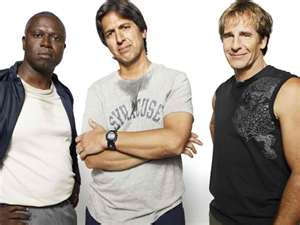 They say nothing brings about the demise of a bad product faster than good marketing.
They say nothing brings about the demise of a bad product faster than good marketing.
I offer that little pearl of wisdom as a preface to the following.
I just heard this week that TNT is not renewing one of the smartest, most well-written, well-acted and genuinely human shows on all of television.
Apparently, Mike Royce and Ray Romano (the co-producers of Men of a Certain Age which, had it targeted women and been given a theatrical release, might have been cynically called a "chick flick") were told by the number-crunchers at TNT "thanks but no thanks" to their offer of a third season.
Remember, this from a network that promotes itself ad nauseam under the blatantly self-serving banner, "We know drama."
Understand, I worked in cable nearly 30 years. And throughout much of my career I took great pride in watching original scripted cable dramas get smarter and smarter each year, and more and more daring, while at the same time watching the major broadcast networks continue to fight harder and harder over the lowest common denominator of American viewer, like dogs over a steak bone.
What's more, I understand the basic economics. Cable networks have this robust stream of recurring revenue from two separate and distinct sources; hundreds of millions in advertising dollars, plus an equivalent amount in monthly licensing fees paid to them by cable operators.
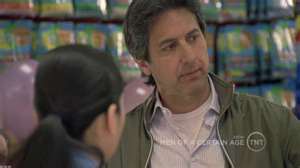 Which means, of course, such networks operate under a radically different economic model than their broadcast brethren, one that allows them to take far more programming risks, while at the same time affording them the luxury of being far more patient with quality shows that target older, more discriminating audiences.
Which means, of course, such networks operate under a radically different economic model than their broadcast brethren, one that allows them to take far more programming risks, while at the same time affording them the luxury of being far more patient with quality shows that target older, more discriminating audiences.
So when I heard that TNT was pulling the plug on such a compelling and beautifully crafted series as Men of a Certain Age without ever truly offering it a chance to develop an audience, while at the same time a giving big, wide-eyed thumbs-up to an utterly unwatchable piece of crap like Rizzoli and Isles, as well as two harmless but otherwise pedestrian formulaic procedurals, Memphis Beat and Leverage, I immediately thought of the network's tag line and found myself choking on the irony.
TNT knows drama? Gimme a break.
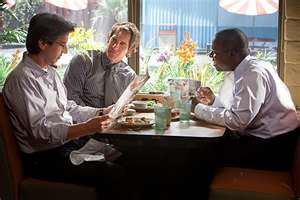 As for Men, its premise was simple enough. Three lifelong friends -- all men, all turning 50, and all facing the harsh reality that the lives they're now living are not nearly the lives they envisioned for themselves as kids -- get together over breakfast in a diner-style family restaurant on a regular basis to laugh, talk and find a bit of safe harbor in each other's company and their common experiences.
As for Men, its premise was simple enough. Three lifelong friends -- all men, all turning 50, and all facing the harsh reality that the lives they're now living are not nearly the lives they envisioned for themselves as kids -- get together over breakfast in a diner-style family restaurant on a regular basis to laugh, talk and find a bit of safe harbor in each other's company and their common experiences.
But the beauty of the show was not in its premise. It was in its execution. Rather than being overly -- or perhaps overtly -- self obsessed, and constantly searching for (and droning on and on) about deeper meanings and higher truths, the central characters only sought little momentary slices of happiness in their day-to-day lives.
And the show's drama, as subtle as it often was, grew out of the simple fact that, for men of a certain age -- hell, for people of a certain age -- happiness, even momentary happiness, is more often than not a moving target.
As far as the cast went, Andre Braugher -- an actor noticeably heavier and clearly more daring than during his Homicide: Life on the Street days -- was the most honored, and deservedly garnered two Emmy nominations for his portrayal of Owen, a guy we've seen time and time again in pop culture: a doughy, gone-to-seed, middle-aged salesman (this one trafficking in new cars) trying to crawl out from under the weighty-to-the-point-of-crushing expectations of his high-achieving, domineering and icy-cold father.
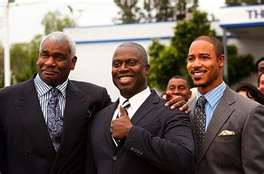 Scott Bakula, on the other hand, got a chance to play a character one really only finds within the gravitational pull of Hollywood; Terry, an aging, never-made-it, strutting rooster of a still-single actor whose options -- both in acting jobs and female companionship -- continue to grow more finite by the day.
Scott Bakula, on the other hand, got a chance to play a character one really only finds within the gravitational pull of Hollywood; Terry, an aging, never-made-it, strutting rooster of a still-single actor whose options -- both in acting jobs and female companionship -- continue to grow more finite by the day.
And like he's done time and time again, regardless of the vehicle, Bakula brought to a role which could have been played as broad stereotype, a very real and entirely believable guy-next-door quality, as well as a relaxed, open-collar sense of dignity.
 But the real revelation in Men of a Certain Age was Romano as the show's emotional core.
But the real revelation in Men of a Certain Age was Romano as the show's emotional core.
Honesty compels me to admit I never watched -- because I never really enjoyed -- the comedian's almost criminally bland sitcom, Everybody Loves Raymond. But the few times I did see it, I came to the conclusion that Romano, much like George Burns or Jerry Seinfeld in their respective hit sitcoms, was not so much acting as he was serving as ringleader to the situational mayhem that his writers and fellow cast members perpetrated around him.
In Men of a Certain Age, however, Romano's performance was downright brilliant. And not just garden-variety brilliant, but brilliant in an odd, quirky, almost indescribably understated sort of way.
In playing his character, a moderately successful party-store owner named Joe, whose marriage has failed, Romano affected a sheepish grin and a sort of distant, blank stare, to go along with a hushed, almost mumbling manner of speech, all of which gave Joe both an unmistakable air of melancholy and a remarkably endearing sense of humanity.
In fact, Romano's less-is-more approach to Joe's most vulnerable and uncertain moments often made them so real as to border on uncomfortable for the viewer. Yet you found yourself constantly rooting for the guy, in large part because you came to care so deeply for him.
In fact, even as I write this I realize that much of my frustration over TNT's decision to cancel Men is based on the fact that I really grew to really like Romano's Joe, and am upset I won't be afforded the opportunity to check on him every now and then, just to see how he's doing with his love life, his gambling addiction, and his quest for a spot on the PGA Senior Tour.
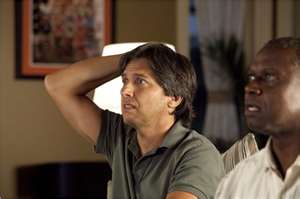 The scene that really sold me on Romano occurred during the first season. In the episode, Joe's daughter has been called a "whore" by her boyfriend, an otherwise decent kid named Travis, who she's just broken up with. Late one evening, Joe knocks on the kid's window as he's parked, lights off, outside his daughter's house. (Joe's no longer living in the house, since he'd recently moved out and into a hotel.)
The scene that really sold me on Romano occurred during the first season. In the episode, Joe's daughter has been called a "whore" by her boyfriend, an otherwise decent kid named Travis, who she's just broken up with. Late one evening, Joe knocks on the kid's window as he's parked, lights off, outside his daughter's house. (Joe's no longer living in the house, since he'd recently moved out and into a hotel.)
As Joe slides into the passenger seat, the two have the stern, don't-mess-with-my-daughter conversation Joe had planned on having with the kid the moment he heard what Travis had called her.
The scene's dialogue is simple, yet beautiful, and watching Romano play it you sense in him an almost palpable undercurrent of decency, understanding and compassion. As Joe watches the young man try to put his gnawing, stomach-churning pain into words, his anger fades and he realizes that he and this tearful teenager are united by more than their mutual love for his daughter.
They may be men of a different age, but they are truly brothers in heartbreak.
At one point, Joe even has trouble looking at Travis, because in many ways Travis is Joe, and Joe is what the kid is going to become even before he realizes what's happening to him.
And what's more, Travis, in his own raw, teenage angst-ridden sort of way, is verbalizing exactly what Joe has been unable to put into words about the slow-motion train wreck his marriage and life have become.
It's an absolutely wonderful television moment, played to understated perfection by both Romano and Marshall Allman (a young man with enough acting chops to have merited recurring roles on both Fox's Prison Break and HBO's True Blood).
The scene is not only poignant and deeply moving, it is one that -- like apparently far too many others in Men of a Certain Age -- proved to be way too smart for television.
And that's sad, because until recently comments like "too smart for television" had always been cynically reserved for broadcast shows. Now, thanks in part to this decision by TNT, it apparently has merit on the cable side of equation as well.
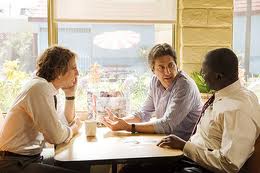 So while TNT can continue to crow about its deep and abiding knowledge of drama, and can continue to market its youth-obsessed original series as "great dramas," those of us who know better, do indeed know better.
So while TNT can continue to crow about its deep and abiding knowledge of drama, and can continue to market its youth-obsessed original series as "great dramas," those of us who know better, do indeed know better.
In fact, so much so that these days every time I see TNT promos for silly, hour-long exercises in demographics-over-art like Rizoli & Isles and Franklin & Bash that conclude with the phrase, "We know drama," I immediately think of another network tag line; the one used by TNT's kissin' cousin, TBS.
You know the one, don't you?
Sure you do.
We know drama. Very funny.
